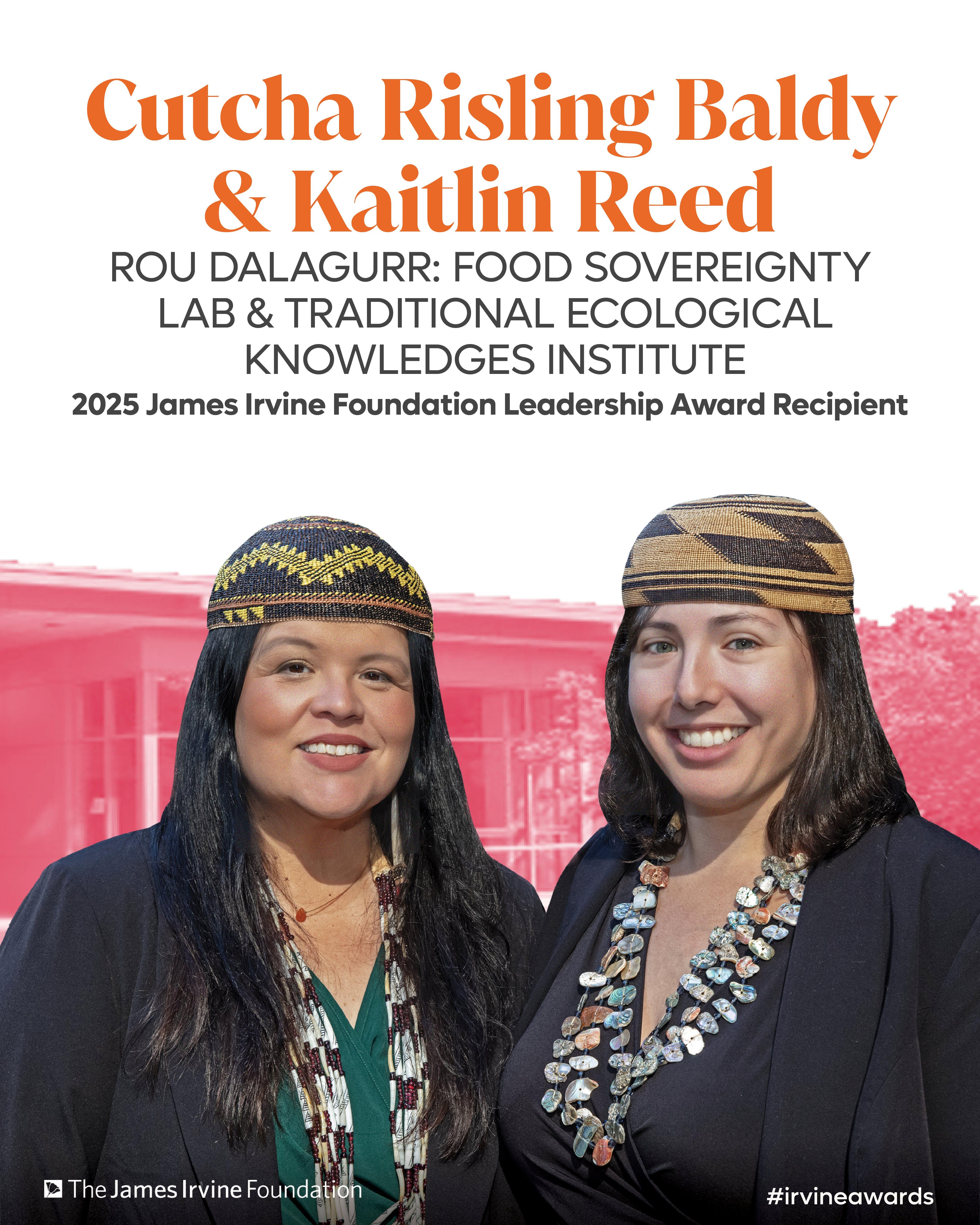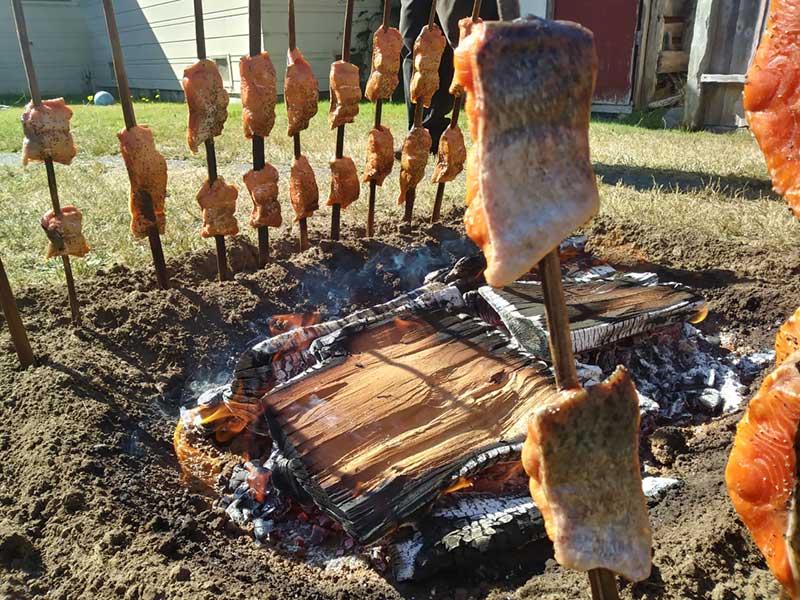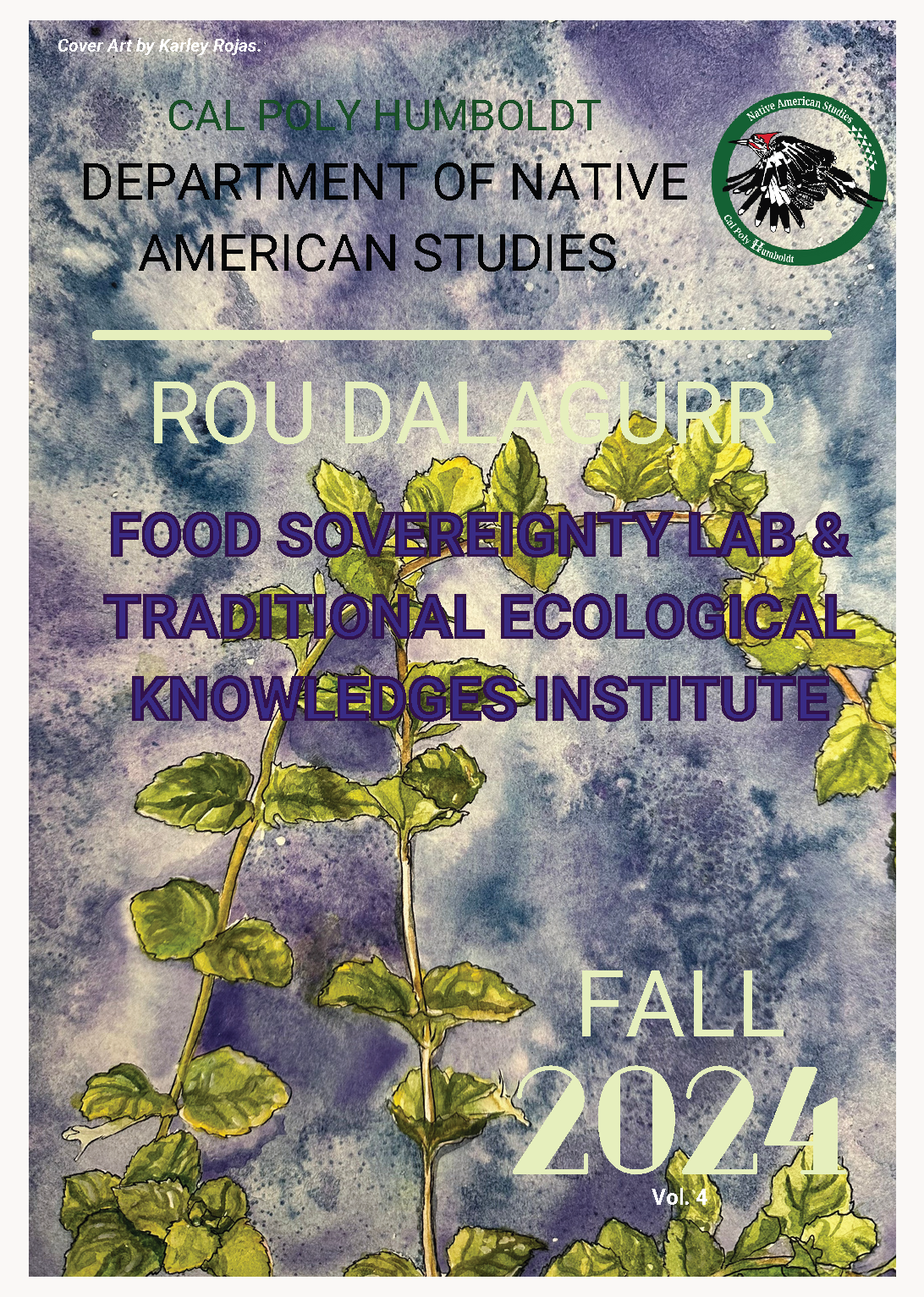Rou Dalagurr Food Sovereignty Lab and Traditional Ecological Knowledges Institute
Rou Dalagurr: Food Sovereignty Lab & Traditional Ecological Knowledges Institute Co-Directors Cutcha Risling Baldy and Kaitlin Reed receive The 2025 James Irvine Foundation Leadership Award.

This week, The James Irvine Foundation announced Rou Dalagurr: Food Sovereignty Lab & Traditional Ecological Knowledges Institute Co-Directors Cutcha Risling Baldy and Kaitlin Reed were named 2025 Leadership Award recipients. The Award comes with a $350,000 grant to continue improving community wellbeing through Indigenous knowledges and food sovereignty.
Cutcha Risling Baldy and Kaitlin Reed, 2025 Leadership Award Recipients
About the Lab
In 2019, HSU Students in NAS 331 had a vision for a project that would re-indigenize the campus while bringing lasting benefits to the community, building partnerships across campus, and reconnecting students with place. These student-youth represented twelve different majors from both the College of Arts, Humanities & Social Sciences and the College of Natural Resources & Sciences. Students worked collaboratively during the semester to interview Native faculty and staff on campus, Native students, and also held a community stakeholders meeting to discuss the implementation of a Food Sovereignty Lab and Cultural Workspace at Humboldt. This research was subsequently awarded second place in the Social Sciences Graduate Research division of the CSU Student Research Competition in April 2020. The project envisioned was the Cal Poly Humboldt Native American Studies (NAS) Rou Dalagurr Food Sovereignty Lab and Traditional Ecological Knowledges Institute (FSL). To learn more about how this research started watch the linked video: Telling the Story of the NAS Food Sovereignty Lab & Cultural Workspace.
The Food Sovereignty Lab, which broke ground on October 8th 2021 following a student-led effort which raised over $250,000, is dedicated to the learning, research, hands-on practice and preservation of food sovereignty and Traditional Ecological Knowledges. The purpose of the FSL is to provide an opportunity to work directly with the surrounding communities, tribal nations, and national and international scholars and community leaders to center, learn, and engage with Indigenous science, environmental management, and preservation practices. The lab will build national and international connections that foreground Indigenous voices in rigorous academic research, publications and community-centered programming, connecting youth to higher education, policy development, economic development, and climate resiliency.
To be very clear, the Food Sovereignty Lab is a space to facilitate research, but we are not doing this without Indigenous input that foregrounds Tribal autonomy and self-determination. This lab is about ensuring Indigenous sovereignty is upheld, and that Indigenous communities maintain self-determination over how their knowledges are approached, researched, engaged with, represented, and managed. Community voice and representation is prioritized in this lab. Indigenous knowledge is not a monolith, and traditional ecological knowledges are specific to each originating community- these knowledges are localized and place-specific. As such, they need to be housed and represented with and by those communities. Our lab includes a Steering Committee which has representatives appointed by each of the tribal nations in Humboldt/Del Norte Counties. In addition, we have student representatives and representatives from Food Sovereignty focused tribal organizations. This Steering Committee reviews lab policies and procedures and provides feedback on projects and programs. The Steering Committee is also working to provide insight and partnership building with other organizations, institutes, institutions and businesses interested in engaging with Food Sovereignty and TEK. The Lab publishes bi-annual reports, such as our Summer 2022 Report, that are publicly available and include information about budget; operations; program and project updates.
Goals for the lab align perfectly with Cal Poly Humboldt’s polytechnic designation. According to the Polytechnic Prospectus, the university seeks to be a “model and leader for others across the country and globe”, and “believe[s] in working directly with tribal communities.” Rou Dalagurr will incorporate hands-on experience for students by training them to engage with tribal communities, while also appealing to students which will help with recruitment, enrollment, and retention through programs that can serve as a model to others throughout the world.
To fully understand food sovereignty, one must understand the history of the impacts of colonization on the Indigenous nations of this region. Genocide was carried out by severing the connection between people and their culture. Forced separation of native people from their traditional food sources was a political goal to enact genocide against those communities, as “disrupting Native relationships with the land ‘not only created physical hardship’ but ‘also bankrupted many meaning structures that informed identity and mechanisms of socio-cultural reproduction and control’”. As stated in the Declaration of Nyéléni, there are six proposed principles of food sovereignty: focusing on food for people, valuing food providers, localizing food systems, making decisions locally, building knowledge and skill, and working with nature. According to Dr. Cutcha Risling Baldy and Dr. Kaitlin Reed, the Co-Directors of the Food Sovereignty Lab, food sovereignty is also about centralizing Indigenous voices in how we collectively move forward in building sustainable food systems. Therefore, the revitalization of traditional food sources through Indigenous food sovereignty is critical to how we build food sovereignty in our region and beyond, while also reawakening and healing Native relationships with the land.
Vision
The Food Sovereignty Lab will sit adjacent to the Native Fourm and Goudin'i Gallery in the Behavioral and Social Sciences building, BSS 168. The Food Sovereignty Lab also been allocated the space exterior to the BSS, down to general parking lot 15, which has been named ‘Wiyot Plaza’. ‘Wiyot Plaza’ will serve as an experiential learning laboratory and classroom for the Lab and serve the regional Indigenous community.
This space will:
- Develop curriculum, internships, research opportunities, workshops, and programs.
- Provide space that supports basket weaving, food preparation, and regalia making.
- Strengthen the bond between our local community, Indigenous Nations, and students at Humboldt
- Integrate the values of ecological sustainability, bio-cultural sovereignty of Indigenous peoples, interconnectedness of life, and community involvement in efforts to develop reverence for food sovereignty.
Testimonials

“Having this Center would give all Humboldt students opportunities to see the vibrancy and modern existence of Indigenous Peoples and cultures in our local area. Just like the other places of learning on campus that are shared by all students, such as the Botany greenhouse and the art galleries, the Indigenous Food Sovereignty Lab would be a place to share this knowledge with all Humboldt students and the broader community. The Lab would also attract future students because, at this particular moment of a global pandemic, the world is learning about the value of traditional Indigenous knowledges.” (Critical Race & Gender Studies Department)
“The food sovereignty lab would serve more than just a space for student education and acceptance, it would also help build connections with surrounding communities, tribal nations, and national and international scholars and community leaders. Imagine a place where healing occurs as students meet future employers. Not to mention the work will lend more engagement in our food systems. As we face global pandemics and climate change, (all relating and showing us how much we need each other) this lab will bring the opportunity to rewrite the way we see our food. Food should be a direct line to the earth and within food sovereignty, we have the means to cultivate that directly on our campus.” (Environmental Studies Major, Humboldt)
“Such a lab could provide hands on experience for students and Tribal members in fields such as botany, biology, genetics, anthropology, Native American Studies, and Natural Resources Management, to name a few. The end result would be an interdisciplinary learning lab worthy of Humboldt that would both attract indigenous people and students from out of the area, while also serving the local indigenous peoples by helping to preserve their food sovereignty and native food security.” (Ted Hernandez, Chairman of the Wiyot Tribe)

